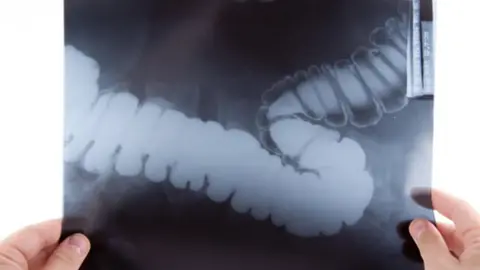Bowel cancer screening requests being ignored
 Getty Images
Getty ImagesSurvival rates for bowel cancer in Wales have improved - but tens of thousands of people are still ignoring requests to get tested for the disease.
A Wales-wide screening programme will mark its 10th anniversary in 2018, with every 60 to 74-year-old invited to take part every two years.
Bowel Screening Wales said 280,000 are asked to take part every year, in a bid to catch the disease at an early stage.
But nearly 128,000 ignore the requests - and a chance of prompt treatment.
"Detecting cancers via screening means we detect them early, so that treatment can be given early," explained Heather Lewis, who is a consultant in health protection at Public Health Wales, which runs the screening programme.
"That participant then has better health outcomes and survival," she added.
Rates for living a year after diagnosis and then five years after diagnosis in Wales have continued to make small improvements since screening was introduced.
The latest figures for the period between 2010-14 show a 3.3% increase in yearly survival, and up 3.9% for five-yearly survival, compared to the pre-screening period of 2005-09.
Overall, 58% of those told they have some form of bowel cancer will still be alive five years later.
However, the disease remains one of the top five cancer killers in Wales - claiming 7,290 lives between 2008 and 2015.
Bowel Screening Wales said it was currently spotting over 200 cases of cancer a year, and also identifying about 1,000 patients who had potentially pre-cancerous tissue polyps removed.
"Over 10 years, that's over 2,000 participants diagnosed with cancer and 10,000 participants would have had polyps removed," said Mrs Lewis.

BOWEL CANCER - WHAT ARE THE SYMPTOMS?
Recent changes in bowel habits over a period of six weeks, including:
- Rectal bleeding or flecks of blood in faeces or stools
- A change in your regular bowel movements, such as constipation or diarrhoea, for a period of six weeks
- Stomach pains which are severe, continual and started recently, especially after eating
- Unexplained weight loss
- Unexplained anaemia (due to a lack of iron in your blood)
(Source: NHS Wales)

But health officials said they accepted there remained barriers to overcome in getting more people tested.
"What we do know is that men are less likely to return their screening kits than women," added the consultant.
"Those people living in a more deprived area are less likely to return their kits as well."
She said some people simply believed they were not at risk: "It's a common misconception that you only have to do the screening if you have symptoms yourself, or you have got a history of bowel cancer, bowel related illness in the family."
And finally, there were some who did not want to go through the actual process of screening, which involves collecting faecal samples over a couple of days.
 Getty Images
Getty ImagesHowever, Bowel Screening Wales said it planned to introduce a new screening test in early 2019 which would mean just one sample is needed.
"So we are hoping the move to that test will make it far more palatable to participants, and hopefully that will improve our uptake as a natural consequence, and we know that has happened elsewhere," said Mrs Lewis.
There are also plans to widen the age group invited to screening, which could see anyone over 50s brought into the programme, which already happens in Scotland.
But the consultant said her overarching message as the 10th anniversary of the screening programme approaches was "please don't ignore your invitation - it could save your life".
